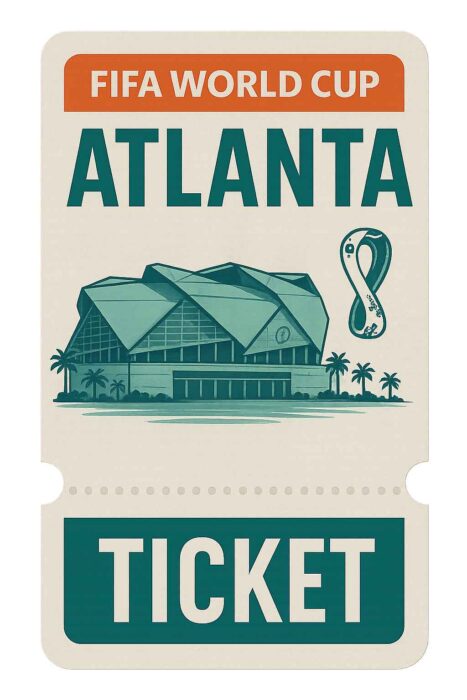Man, let me tell you, when Atlanta landed those World Cup games, I knew I had to be there. But seeing the prices initially? Forget it. My wallet started screaming before I even clicked ‘buy.’ I’m not some tech mogul; I’m a guy who likes a good deal. Paying face value is fine, but paying three times face value to some vulture resale site? No way. So, I decided I was going to crack the code on cheap tickets, or I wasn’t going at all.

My approach, like always, was to ignore the noise and dig into the trenches. I didn’t start with the usual suspects—StubHub, SeatGeek, those massive international ticket brokers. They’re already priced in. I needed the deals that fell through the cracks, the ones only locals or the incredibly persistent find.
Phase One: The Research Grind
First thing I did was map out the schedule. Which games were absolute must-sees, and which ones were the “dump matches”—the ones involving teams with smaller followings or mid-week afternoon slots. That’s where the value hides. Everyone wants the USMNT Saturday night game. Nobody really wants Slovakia vs. Ghana at 1 PM on a Tuesday. I targeted the dump matches.
I started by tracking three main areas simultaneously:
- The official FIFA resale window rumors.
- Local Atlanta corporate package groups on LinkedIn and some obscure subreddits.
- International ticket forums, particularly those based in Europe and South America, just to see what the real price baseline was before the US markup hit.
I spent probably 40 hours over three weeks just refreshing, reading comments, and comparing pricing metrics. It was brutal. Every time a new official release was rumored, the secondary market immediately jacked up their prices 10-15% in anticipation. It was a vicious cycle.
The Moment I Almost Got Burned
I hit a wall fast. Early on, I found this small European site—I won’t name it, but it looked legit—offering tickets for a Portugal group stage match, seats way down low, for less than $200. It looked too good. I clicked through, entered my payment info, and the transaction kept failing. Then, two days later, my bank called me. Someone tried to charge $800 on a grocery store transaction in Eastern Europe. They just harvested my card details. That’s the kind of garbage you deal with when you’re hunting the bottom of the barrel.

That experience made me change my strategy entirely. I realized looking for the cheapest listed price was a mistake. I needed to find the cheapest legitimate source that was desperate to sell.
Phase Two: Targeting the Desperate Sellers
I shifted my focus to corporate tickets. Atlanta businesses bought up huge blocks for client entertainment, and not every client wants to go to every game. These companies aren’t scalpers; they are just trying to recoup some cost or, frankly, just get rid of inventory they can’t expense.
I started calling local event planners—not the big national ones, but the small Atlanta firms that handle logistics for smaller businesses. I was upfront: “I’m looking for any leftover, unwanted corporate seats for the Group D mid-week match.”
I kept a spreadsheet tracking who said no, and who said “maybe call back next month.”
It paid off spectacularly with a small company that specializes in conference planning. They had bought a package of 12 tickets to a less-hyped match back in February, expecting to use them for a customer appreciation event. The event got cancelled.

The guy running the event didn’t care about maximizing profit; he just wanted to cover his initial investment. He had them listed silently on a small internal bulletin board for 10% above face value, which was still half what the major sites were charging.
The Final Takedown and The Real Deal
I drove down to their office—I wanted a physical exchange, no digital BS after my near-scam incident—and paid him cash for two tickets. Category 2 seats, great view, for a total of $185 per ticket. Compared to the $350 to $400 others were demanding for similar seats to similar matches, I basically stole them.
The key takeaway from this whole chaotic process? Don’t chase the lowest posted price; chase the seller with the lowest motivation for profit. They exist, but they aren’t on Google’s front page. You have to hunt them down through local channels and be willing to deal with non-traditional sellers.
If you want cheap Atlanta World Cup tickets, here’s what actually worked for me:
- Ignore the major secondary markets until 48 hours before the game. They are priced for tourists and desperate people.
- Target local B2B service providers. Think smaller firms: accounting, local logistics, mid-tier marketing agencies. They are the ones sitting on unused corporate blocks.
- Be specific about the “dump matches.” If you want the cheap seats, you cannot be picky about the teams playing.
- Use cash for local meetups. This cuts out fees and makes low-volume sellers much happier.
Now I’ve got my tickets secured, barely above face value, and I didn’t have to mortgage my house to see a game. It took persistence, a near financial disaster, and a lot of driving around Atlanta, but it was absolutely worth it.

